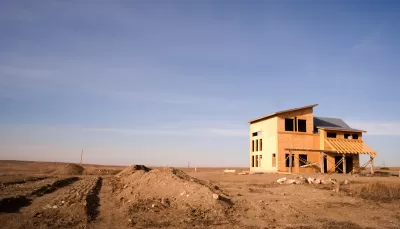Neoliberal politics have built an artificial wall between the public and private sectors when it comes to housing. It’s time for a different paradigm.

We are in the midst of the greatest affordable housing crisis in American history. Even before the pandemic, increases in rents and home prices in urban areas outpaced the increase in wages for most working families. Now, pandemic-induced unemployment is about to cause more people to lose their homes, and many more tenants to be evicted. This severe and persistent crisis calls for a new approach to the provision of housing.
Housing in the United States is uniquely inequitable, even among advanced countries. Data for OECD nations show that the U.S. has one of the highest housing cost burdens in the bottom quintile, in which the median household is spending over half its income on housing, whether it owns or rents. The U.S. has the largest gap in housing cost burdens between the bottom and middle-income quintiles for a median household in the private market, including those with subsidized rents. Yet many of the essential workers who keep our cities functional even during a health emergency are at the bottom of the income ladder. These cost burdens affect owners and renters alike, particularly millennials looking to enter homeownership. The future of the American city itself is at stake.
“Unhousing” the Public Sector
There is no true “public option” in the development of housing in the United States, and definitely none that is available and accessible to most Americans. Each public sector entity works within its own bureaucratic silo with limited accountability. This “unhousing” of the public sector under the neoliberal model has made it easy to villainize the public sector. It has opened the door for criticisms such as that “Big Government” taxes some people to subsidize others, passes regulations to address social issues that make housing an unprofitable commodity, and is an inefficient gatekeeper for private property rights through land-use zoning. Private builders perpetually blame government bureaucrats and politicians for the housing crisis, often while shirking their own social responsibilities.
And yet the abstract distinction between public and private dollars failed to hold up when publicly backed companies, known as government-sponsored enterprises (GSEs), especially Fannie Mae and Freddie Mac, bought the private mortgages of millions of Americans during the Great Recession. These enterprises are currently considering one of the largest public offerings in history to undo these governmental bailouts, and are being advised in this process by Wall Street giants JPMorgan Chase and Morgan Stanley.
A new model of housing provision could harness the collective capacity for concerted social action put into motion by emerging social movements. If we break down these artificial walls, we could marshal the best qualities of both the public and private sectors to provide affordable and accessible housing for all Americans.
FULL STORY: We Need a Federal Housing Agency

Maui's Vacation Rental Debate Turns Ugly
Verbal attacks, misinformation campaigns and fistfights plague a high-stakes debate to convert thousands of vacation rentals into long-term housing.

Planetizen Federal Action Tracker
A weekly monitor of how Trump’s orders and actions are impacting planners and planning in America.

In Urban Planning, AI Prompting Could be the New Design Thinking
Creativity has long been key to great urban design. What if we see AI as our new creative partner?

King County Supportive Housing Program Offers Hope for Unhoused Residents
The county is taking a ‘Housing First’ approach that prioritizes getting people into housing, then offering wraparound supportive services.

Researchers Use AI to Get Clearer Picture of US Housing
Analysts are using artificial intelligence to supercharge their research by allowing them to comb through data faster. Though these AI tools can be error prone, they save time and housing researchers are optimistic about the future.

Making Shared Micromobility More Inclusive
Cities and shared mobility system operators can do more to include people with disabilities in planning and operations, per a new report.
Urban Design for Planners 1: Software Tools
This six-course series explores essential urban design concepts using open source software and equips planners with the tools they need to participate fully in the urban design process.
Planning for Universal Design
Learn the tools for implementing Universal Design in planning regulations.
planning NEXT
Appalachian Highlands Housing Partners
Mpact (founded as Rail~Volution)
City of Camden Redevelopment Agency
City of Astoria
City of Portland
City of Laramie


























